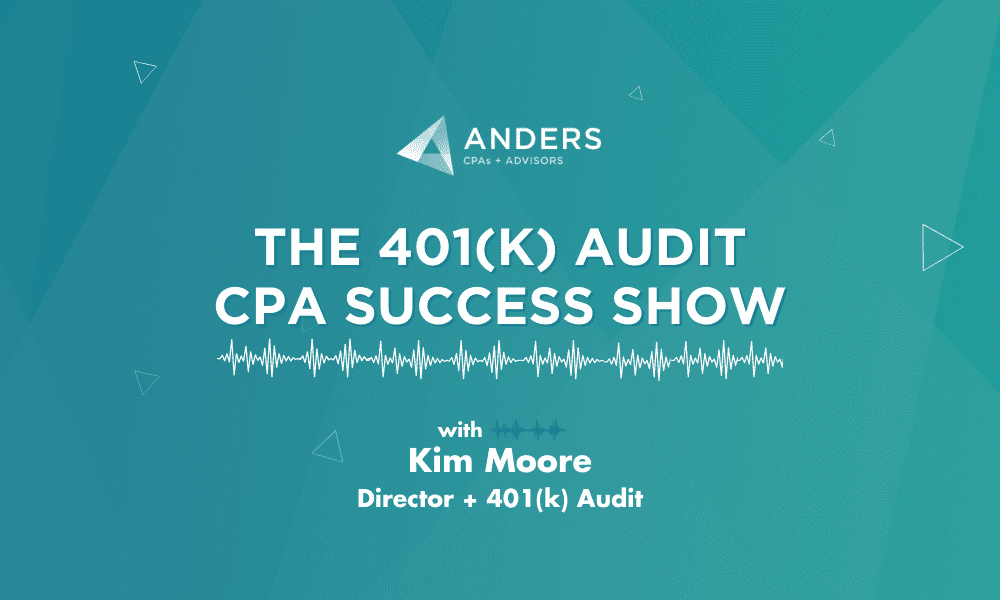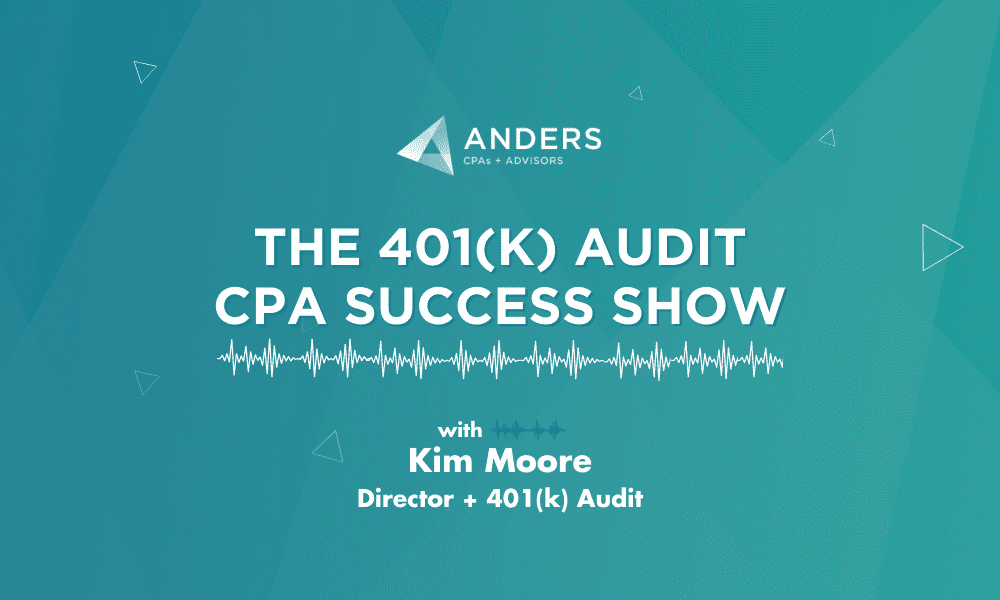A 401(k) audit can often be a lengthy process and looming deadlines can have plan providers feeling anxious over completing the process in time. CPAs and Anders 401(k) auditors Kim Moore and Karen Hill discussed ways to help speed up the process as well as tips on how to keep your auditor focused on your audit. Common pitfalls and mistakes can be avoided with experience on your side.
Key Takeaways:
- Your fiduciary responsibility as the 401(k) plan sponsor regarding your timely filing
- Six ways to keep your audit on track and running smoothly
- Consequences of not filing in a timely manner or not providing auditors with requested information
Getting your organization’s 401(k) audit completed in a timely manner is the best way to avoid being stuck with steep penalties or fines. Luckily, auditors are eager to help clients meet important deadlines and are willing to work with plan providers to ensure a prompt process.
Respond Quickly to Auditor Questions, Requests
The best way to keep the audit process moving forward is to respond quickly to requests or questions from the auditor. Karen recalled one client who made communication such a priority that they were responding to her requests within the same day, if not the same hour.
That throughline of communication allowed Karen to complete the audit in a matter of weeks rather than the several months she’d previously expected. Prompt responses help keep your auditor, who often performs dozens of other audits at the same time, focused on your case.
Keep Auditors Informed about Missing Paperwork
Keep your auditor informed about paperwork that you’re not able to find for them. For instance, if your auditor requests 25 I9 forms, but you only have 20, it would be wise to inform them of that fact. There’s a possibility that the auditor isn’t auditing your I9 forms, but instead looking for hire or termination dates as they try to verify the number of employees.
Letting your auditor know ahead of time gives them a chance to ask for some other form of paperwork or files that contain the information they’re looking for. Auditors generally try to keep you informed about why they’re asking for specific paperwork and will tell you the data they’re after so both parties can be as efficient and effective throughout the process as possible.
Stay Organized for Years to Come
Organization is key during an audit. Keeping previous reports together in a file alongside paperwork past auditors requested can help you prepare for future audits. Having requested paperwork grouped by individual or by type will also help ensure a speedy audit by ensuring that everything your auditor needs is in one place. If there’s anything missing, it’s even simpler for the auditor to identify it, inform you and figure out the next steps.
Double Check the Auditor’s Work
While it might feel strange to double check the work of a professional you hired, it’s a vital step that shouldn’t be overlooked. This doesn’t mean you have to redo the audit yourself. Rather, it’s smart to go back through each of your auditor’s requests to make sure you sent them everything they asked for. Once the audit is nearing completion, inspect the information your auditor has entered about your business or organization to ensure that it’s correct.
For example, if your auditor inserts a claim that your organization uses auto-enrollment when you know for a fact that you do not, that information will need to be corrected before the audit is officially filed. As the one with fiduciary responsibility, you will be on the hook for any inaccurate information, not the auditor.
How Audits Work with a Third-Party Administrator
If you work with a third-party administrator (TPA), you will need to serve as the communication intermediary between them and your auditor. Some TPAs won’t allow auditors access to the information they require, and your auditor likely won’t have the authority to interact with them directly to request what they need. In some instances, you may need to request that your TPA send requested files to your auditor. The importance of keeping track of what information has been sent and if that information has been received by the appropriate party can’t be overstated.
Changes to Form 5500 Audits
For those filing a form 5500 audit, Anders 401(k) will continue to review it, but they are legally no longer allowed to share the draft copy of the audit report with the client or plan sponsor until they see a substantially complete 5500.
401(k) audits don’t need to be a time of intense stress, especially if you prepare far ahead of time and keep up communication with your auditor. These professionals are aware of the constraints you might be under and are deeply committed to seeing you through this.
If you need an audit for your 401(k) plan, consider a specialized firm like Anders CPAs + Advisors. We can provide a quality benefit plan audit that is efficient and accurate.
To get started, request a free 401(k) audit consultation below or contact the team at (314)-886-7913 to schedule an appointment.
Watch the 401(k) Audit CPA Success Show: Simple Steps to Ensure a Speedy 401(k) Audit on YouTube and subscribe on Spotify or Apple Podcasts and let us know what you think by rating and reviewing.


